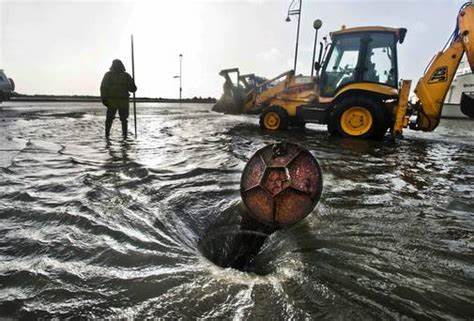
Building Resilient Wastewater Treatment Systems in Extreme Weather: Ensuring Effective Operations in the Face of Climate Change
Introduction
Extreme weather events pose significant challenges to wastewater treatment systems, making resilience a crucial aspect of their design and operation. This article explores the importance and relevance of wastewater treatment systems in extreme weather conditions, emphasizing the significance of resilience in ensuring their effectiveness.
Historical Background
Over time, wastewater treatment systems have evolved to respond to extreme weather events. This section provides an overview of the development of these systems and their ability to withstand and adapt to various weather conditions.
Key Concepts and Definitions
Understanding wastewater treatment systems and extreme weather events is essential. This section defines wastewater treatment systems and highlights their importance. Additionally, it explains extreme weather events and their impact on these systems, while introducing the concept of resilience and its relevance in wastewater treatment.
Main Discussion Points
Design considerations for resilient wastewater treatment systems in extreme weather
Designing wastewater treatment systems that are resilient to extreme weather events requires careful consideration. This point explores understanding local climate and weather patterns, incorporating climate change projections, and utilizing adaptable or modular infrastructure to withstand these events.
Operational strategies for maintaining resilience in wastewater treatment systems
Ensuring the resilience of wastewater treatment systems involves effective operational strategies. This point discusses the significance of regular maintenance and inspection protocols, emergency response plans, and the implementation of redundant systems and backup power sources.
Technological advancements and innovations for enhancing resilience
Technological advancements play a crucial role in enhancing the resilience of wastewater treatment systems. This point examines advanced monitoring and control systems, the integration of predictive analytics and real-time data in decision-making processes, and the utilization of green infrastructure for stormwater management and wastewater treatment.
Case Studies or Examples
Case study: Resilience measures implemented in a hurricane-prone wastewater treatment plant
This case study showcases the design features and operational strategies implemented in a wastewater treatment plant located in a hurricane-prone region. It evaluates the plant’s performance during extreme weather events and highlights the effectiveness of its resilience measures.
Case study: Resilient wastewater treatment system in a flood-prone region
Examining a wastewater treatment system in a flood-prone region, this case study provides an overview of the system’s design and flood management strategies. It also analyzes the system’s effectiveness during flood events, showcasing its resilience.
Current Trends or Developments
Integration of climate change projections in wastewater infrastructure planning
As climate change continues to impact weather patterns, this section explores the integration of climate change projections in planning wastewater infrastructure to enhance resilience.
Adoption of nature-based solutions for enhancing resilience
Nature-based solutions are gaining traction in enhancing the resilience of wastewater treatment systems. This point delves into the adoption of such solutions and their effectiveness in mitigating the impacts of extreme weather events.
Research on the use of renewable energy sources in wastewater treatment facilities
In pursuit of sustainability and resilience, researchers are investigating the use of renewable energy sources to power wastewater treatment facilities. This section highlights ongoing research in this area.
Challenges or Controversies
Financial limitations and budget constraints for implementing resilient measures
Implementing resilient measures in wastewater treatment systems often faces financial limitations and budget constraints. This point discusses the challenges associated with securing adequate funding for such projects.
Balancing the need for resilience with other competing priorities
Wastewater infrastructure faces various competing priorities, making it challenging to strike a balance between resilience and other considerations. This section explores the controversies and debates surrounding this issue.
Disagreements on the best strategies for enhancing resilience
Determining the best strategies for enhancing resilience in wastewater treatment systems can lead to disagreements. This point examines the differing opinions and debates around the most effective approaches.
Future Outlook
Anticipated impacts of climate change on wastewater treatment systems
Looking ahead, this section explores the anticipated impacts of climate change on wastewater treatment systems and emphasizes the need for proactive measures to enhance resilience.
Potential advancements in technology and design for enhancing resilience
Technological and design advancements hold promise for enhancing the resilience of wastewater treatment systems. This point discusses potential future developments in these areas.
Importance of continued research and collaboration
Continued research and collaboration are vital in ensuring the resilience of wastewater treatment systems. This section emphasizes the importance of ongoing efforts in advancing knowledge and practices.
Conclusion
In conclusion, this article highlights the key points discussed, emphasizing the significance of resilient wastewater treatment systems in extreme weather conditions. By ensuring effective operations and proactive measures, these systems can withstand the challenges posed by climate change and extreme weather events.